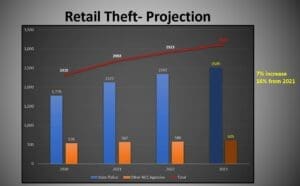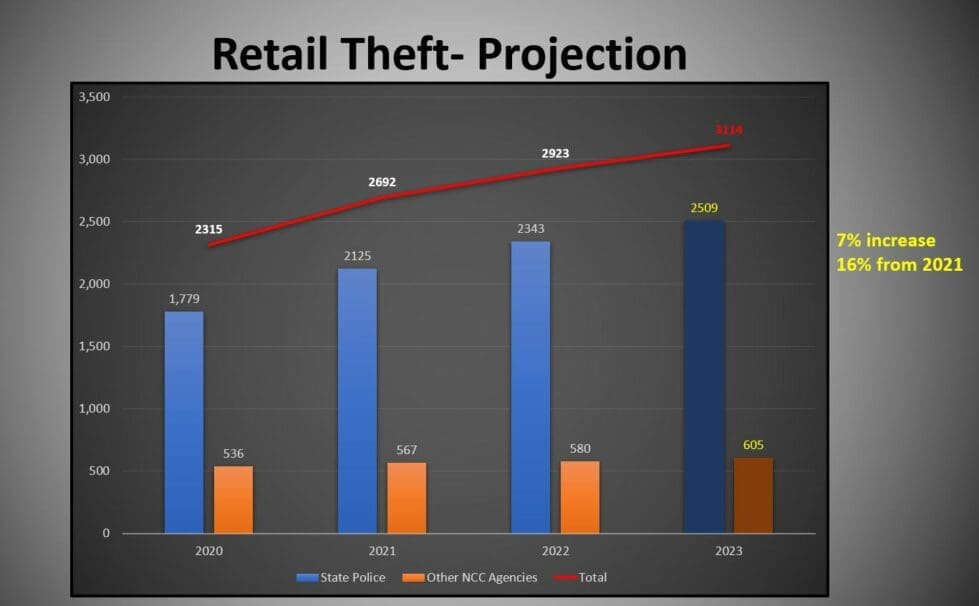
A Delaware State Police analysis of retail theft shows that theft reports are expected to continue rising through the end of 2023.
Retail theft in Delaware is causing concerns among local families and business owners. The economic impact, according to industry experts, could result in store closings.
One mom posting recently in a Delaware moms’ Facebook group described how outraged she was as she stood in a store and watched people grab merchandise and run.
A deluge of comments followed with dozens of moms talking about how they were flabbergasted to see the same thing in stores they were in, and almost all the stores were different.
Many talked about how it frightened them and made them feel unsafe to be there when it was happening.
They’re likely to see more.
The number of retail thefts reported in New Castle County — including theft by people working together or targeting specific items — is expected to rise 16% over last year, and it’s been rising since the middle of 2020, according to a Delaware State Police analysis.
From January through August, more than 10,000 cases of retail theft were reported in New Castle County alone, the analysis said.
“If the level of theft continues increasing, I would not be shocked or surprised to see retailers close in Delaware,” said Julie Miro Wenger, executive director of the Delaware Food Industry Council, which represents grocery and drugstores with a total of 12,000 employees.
Miro Wenger said she couldn’t be certain who might close.
“But I would not be surprised if we saw a general retailer close,” she said.
Finding an estimated dollar value to put to those thefts is near impossible, but the numbers land in the millions in lost revenue and products and put a staggering pressure on store staff and management, industry members say.

Retail theft hits a wide variety of businesses, according to this Delaware State Police analysis of New Castle County theft.
It also affects shoppers.
The average customer has seen the byproducts of retail theft: Increased security, some items locked up, entrances closed in the evening to force all traffic in and out through one door.
Giant Food, CVS, Acme and others have locked up popular items and closed secondary entrances in the evening and at night.
Theft at department stores make up the highest category of thefts, according to Delaware State Police statistics.
In New Castle County, those stores include Target, Old Navy, Boscov’s, Kohl’s, Ulta, Walmart, Lowe’s, The Home Depot, Walgreens, Wawa, Macy’s, Dick’s and JCPenney, according to a recent State Police presentation at Food Industry Council Retail Theft Symposium.
These aren’t kids stealing a candy bar or a mom down on her luck stealing a can of infant formula.
Organized retail theft — groups of people who target specific stores or items — is a growing problem in Delaware, retailers, police and prosecutors say, although everyone says it’s not at the level of last week’s mass looting in Philadelphia.
Some organized groups are essentially taking orders for products that will be resold, police said.
Top 5 items taken in thefts
The top five things stolen right now, according to Delaware State Police:
- Cigarettes
- Dove body wash
- Tide detergent
- Over-the-counter medications
- Meat and seafood
Much of that is resold online or to other retailers, say, selling shrimp stolen at a grocery store to a restaurant, police said.
New York magazine in January took a detailed and disturbing dive into the issue of that trend, which it called e-fencing.
Complicating the issue even more for Delaware retailers, police and prosecutors, and particularly in New Castle County, is that thieves can easily hit stores in New Jersey, Delaware and Pennsylvania in a matter of hours, making prosecution harder.
Getting specific details is difficult.
Ask companies who run stores in Delaware for comments about retail theft and what’s happening and it’s radio silence, with representatives saying they’ve been told not to talk.
Some of that silence is that the dollar amount can be considered proprietary information.
A lot of it’s political — fear of ending up on the end of an angry crusade that becomes a public relations nightmare.
While State Police have officers who focus on shoplifting and retail theft, it’s only part of their jobs. The same is true in the state Department of Justice.
“I can tell you as a whole the entire public sector to include the police is having huge staffing problems right now,” said Mat Marshall of the Delaware Department of Justice. “Unfortunately, I think one of the byproducts of that is that they have to focus resources on violent crime before they can focus them on some of the things that I think business owners would ideally like to see.”
The DOJ and the Food Industry Council have routine meetings to discuss the issue.
About 35% of retail theft cases end in convictions, but they can drag through the courts for years, store representatives say.
Some of the cases don’t end in conviction because the evidence isn’t strong enough.
One of the points of the Retail Theft Symposium was to train retailers on how to increase their chances by doing things like putting security cameras at face level, rather than having them posted high on a wall, where a person’s face can’t be seen clearly.
To speed up prosecution, store owners would like to see dedicated teams of police and prosecutors, as well as special court calendars that only deal with the cases.
The Department of Justice supports the idea of a special court calendar, but is unlikely to have the manpower any time soon to focus on just theft, Marshall said.
Not all retail theft is reported, as the women on the moms’ Facebook page discussed.
Some stores don’t want employees to try to stop thieves, who must leave the store with items in order to be prosecuted.
Some stores cut deals with the alleged thieves and have them sign an agreement to pay the store a fee in exchange for not being prosecuted.
Some stores have limits on the dollar amount of theft they will prosecute.
Many jewelry stores already have locks on their doors, and clients must be buzzed in, Wenger said.
“I could certainly see limitations on some of our smaller retail establishments, nonjewelry, where only X number of kids or X number of shoppers would be allowed in at a time,” she said. “From a security standpoint, I can see that happening here.”
Fear of being exposed to some kind of theft or being made to feel unsafe is another hurdle stores have to worry about, Wenger said.
“Our shoppers every day have a decision to make,” she said. “Are they going to go into brick and mortar retail or are they going to stay home in the comfort and safety of their home and shop online?
“Safety is a major factor. People obviously are shopping at home because of the convenience factor, but if they do not feel safe, they’re not coming to brick and mortar. And so that is a real threat for us every day.”

Betsy Price is a Wilmington freelance writer who has 40 years of experience, including 15 at The News Journal in Delaware.
Share this Post




